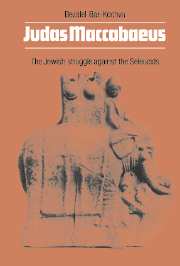Book contents
- Frontmatter
- Contents
- List of illustrations
- Transliteration of Hebrew
- Acknowledgements
- Prologue
- PART I HISTORICAL EVALUATION
- PART II ACCOUNTS OF THE BATTLES: INTRODUCTION, TEXT AND COMMENTARY
- PART III APPENDICES
- A The infantry Royal Guard in the Seleucid army
- B ma'arāḵā (= formation) and fālanḵs in the Hebrew original of I Maccabees
- C Was a Seleucid military settlement established in Jerusalem?
- D The location and history of the Seleucid citadel (the Akra) in Jerusalem
- E The chronology of Antiochus Epiphanes' expedition to the eastern satrapies
- F Defensive war on the Sabbath according to the Books of the Maccabees
- G The ceremony at Mizpah and the chapter on ‘(the Priest) Anointed for Battle’ in the mishnaic tractate Sotah
- H The Babylonian Jews and the Galatians
- I The geographical background and chronological sequence of the clashes with Timotheus in the Second Book of the Maccabees
- J The negotiations between the Jews and the Seleucid authorities in the reigns of Antiochus Epiphanes and Antiochus Eupator
- K The chronology of Lysias' second expedition
- L The route of Bacchides' second expedition to Judaea
- EXCURSUS
- Plates
- Abbreviations
- References
- Indexe locorum
- General index
- Index of Greek terms
- Index of Hebrew words and phrases
F - Defensive war on the Sabbath according to the Books of the Maccabees
Published online by Cambridge University Press: 04 August 2010
- Frontmatter
- Contents
- List of illustrations
- Transliteration of Hebrew
- Acknowledgements
- Prologue
- PART I HISTORICAL EVALUATION
- PART II ACCOUNTS OF THE BATTLES: INTRODUCTION, TEXT AND COMMENTARY
- PART III APPENDICES
- A The infantry Royal Guard in the Seleucid army
- B ma'arāḵā (= formation) and fālanḵs in the Hebrew original of I Maccabees
- C Was a Seleucid military settlement established in Jerusalem?
- D The location and history of the Seleucid citadel (the Akra) in Jerusalem
- E The chronology of Antiochus Epiphanes' expedition to the eastern satrapies
- F Defensive war on the Sabbath according to the Books of the Maccabees
- G The ceremony at Mizpah and the chapter on ‘(the Priest) Anointed for Battle’ in the mishnaic tractate Sotah
- H The Babylonian Jews and the Galatians
- I The geographical background and chronological sequence of the clashes with Timotheus in the Second Book of the Maccabees
- J The negotiations between the Jews and the Seleucid authorities in the reigns of Antiochus Epiphanes and Antiochus Eupator
- K The chronology of Lysias' second expedition
- L The route of Bacchides' second expedition to Judaea
- EXCURSUS
- Plates
- Abbreviations
- References
- Indexe locorum
- General index
- Index of Greek terms
- Index of Hebrew words and phrases
Summary
Students of the history of the halakha, the Jewish Oral Law, have generally agreed on the assumption that defensive warfare on the Sabbath was not permitted until early in the Hasmonaean Revolt. This assumption became a basic point in the theory on the development of the halakha. The few dissenters, some of whom came from the ranks of the orthodox rabbinate, were disregarded, either because of a dogmatic approach to the source and antiquity of the Oral Law, or because of unsystematic and incomplete consideration of Hellenistic sources.
The accepted view is based on the story of Agatharchides of Cnidus quoted by Josephus that the Jews did not defend themselves when Ptolemy I son of Lagus overcame Jerusalem on the Sabbath (Ant. 12.6), and on the tradition in I Maccabees (2.29–37) concerning the devout who took refuge in caves and did not defend themselves when attacked on the Sabbath. According to this view, the change took place with the declaration of Mattathias and his company, who in response to that incident demanded to fight on the Sabbath (I Macc. 2.38–40). And indeed from then on the Jews defended themselves on the Sabbath; so it was in the time of Jonathan (I Macc. 9.43–8), Alexander Jannaeus (Ant. 13.337) and at the height of the Great War with Rome. This array of evidence is augmented by various references in II Maccabees (5.25–6, 6.11, 8.25–6, 15.1–5) from which there was an attempt to deduce that its author opposed defensive warfare on the Sabbath.
- Type
- Chapter
- Information
- Judas MaccabaeusThe Jewish Struggle Against the Seleucids, pp. 474 - 493Publisher: Cambridge University PressPrint publication year: 1989



